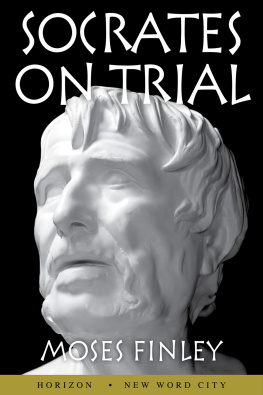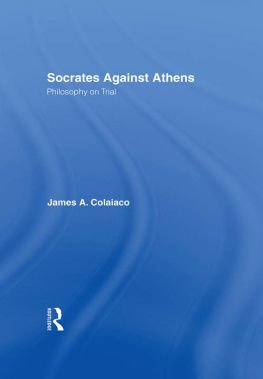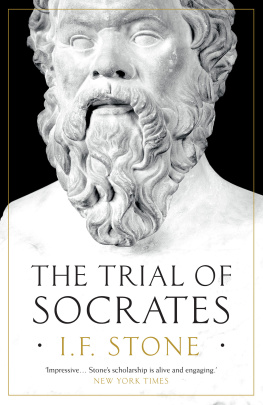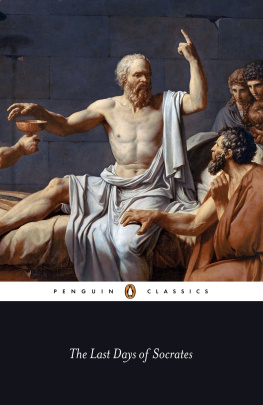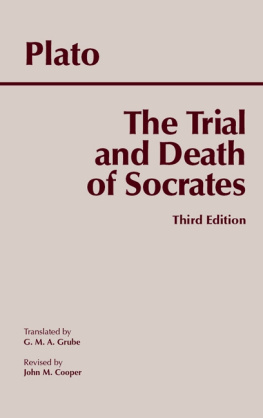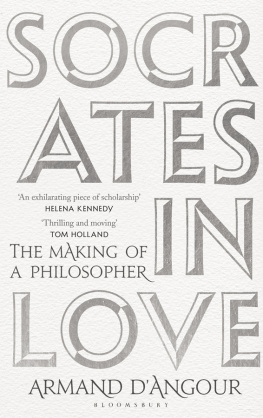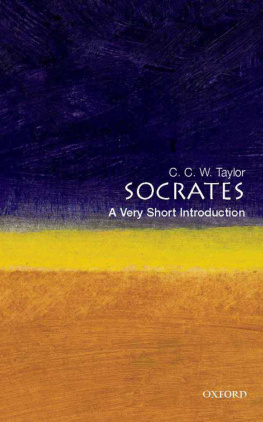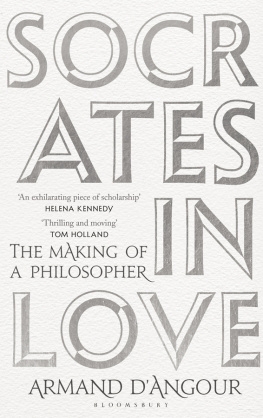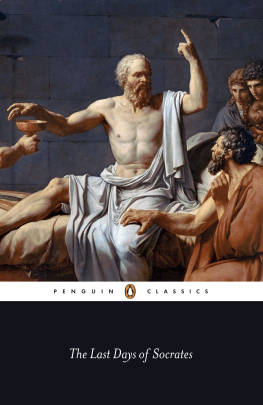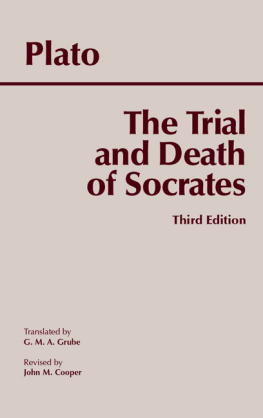Moses Finley - Socrates on Trial
Here you can read online Moses Finley - Socrates on Trial full text of the book (entire story) in english for free. Download pdf and epub, get meaning, cover and reviews about this ebook. year: 2014, publisher: New Word City, genre: Religion. Description of the work, (preface) as well as reviews are available. Best literature library LitArk.com created for fans of good reading and offers a wide selection of genres:
Romance novel
Science fiction
Adventure
Detective
Science
History
Home and family
Prose
Art
Politics
Computer
Non-fiction
Religion
Business
Children
Humor
Choose a favorite category and find really read worthwhile books. Enjoy immersion in the world of imagination, feel the emotions of the characters or learn something new for yourself, make an fascinating discovery.
- Book:Socrates on Trial
- Author:
- Publisher:New Word City
- Genre:
- Year:2014
- Rating:5 / 5
- Favourites:Add to favourites
- Your mark:
- 100
- 1
- 2
- 3
- 4
- 5
Socrates on Trial: summary, description and annotation
We offer to read an annotation, description, summary or preface (depends on what the author of the book "Socrates on Trial" wrote himself). If you haven't found the necessary information about the book — write in the comments, we will try to find it.
Socrates may be dead, but the issues that led him to drink that iconic glass of hemlock are not. Was Socrates guilty as charged? Here, in this short-form book, is the surprising - and complicated - answer.
Socrates on Trial — read online for free the complete book (whole text) full work
Below is the text of the book, divided by pages. System saving the place of the last page read, allows you to conveniently read the book "Socrates on Trial" online for free, without having to search again every time where you left off. Put a bookmark, and you can go to the page where you finished reading at any time.
Font size:
Interval:
Bookmark:
In 399 B.C., when the seventy-year-old philosopher and teacher Socrates was put on trial in his home town of Athens, the proceedings began with the reading of the charges against him: This indictment and affidavit are sworn by Meletus ... against Socrates.... Socrates is guilty of not believing in the gods in which the city believes and of introducing other new divinities. He is also guilty of corrupting the young. The penalty proposed is death.
A jury of 501 men, all citizens in good standing, all over the age of thirty, was assembled. The Athenian system of government was amateur in the strict sense of the word: There were no district attorneys, no professional lawyers, and few police. If a crime was committed, major or minor, some private citizen had to lay a charge before the proper official, as Meletus did, attend the trial, mount the rostrum, and present his arguments to the jury. In the case against Socrates, Meletus was supported by two other men, both older than he: Anytus and Lycon. When they had taken their allotted time, measured by a water clock , it was Socrates turn to speak. He pronounced himself not guilty, defended his lifes work and his ideas, and challenged Meletus to produce the young men whose religious beliefs he had corrupted.
The parade of witnesses lasted for hours, while the jury sat on their wooden benches and the spectators stood behind them. When the speeches were finished, the jurors lined up one by one and dropped their ballots into an urn. The votes were counted in sight of everyone, and the result was announced immediately: guilty 281, not guilty 220. There was no possibility of appeal.
When Socrates was convicted, the jury had next to fix the penalty, which they did by voting once more, this time on choices put to them by the accuser and the defendant. Meletus asked for the death penalty. In reply, Socrates seems to have made a series of frivolous counterproposals one, that he be allowed to live at the expense of the public in the Prytaneum . His behavior was so offensive to the jurors that, if ancient evidence is true, eighty of them switched their votes in favor of capital punishment. Socrates was then taken to jail, and the jurors went home after receiving three silver obols , about half a days pay for a worker. A month later, Socrates drank a cup of hemlock and died, quickly and painlessly, having refused his friends efforts to persuade him to flee the country.
While this much about the trial of Socrates is clear and relatively straightforward, remarkably little else is. Socrates is long dead, but his trial lives on as an example of how majority rule can crush the voice of reason and individual conscience. That is why it is still crucial to know the facts behind the myth.
The prime source of the mythology surrounding Socrates is an early work of Plato s known as the Apology. This book appeared a few years after the trial and pretends to be the actual text of Socrates two speeches to the jurors. In fact, that was an impossibility: All the proceedings were oral. There were no stenographers, and no official record was kept other than the text of the indictment and the verdict. Unless the speakers themselves had written their speeches beforehand and preserved them, there was no transcript of the trial. Instead, Apology is a brilliantly dramatic piece in which Platos hand is visible in every paragraph. There are two other accounts of Socrates trial, both by the historian and philosopher Xenophon (still others existed in antiquity but are now lost), but these versions are not in agreement.
These apologies were easily written and circulated precisely because there was no authentic text of what Socrates truly said. In fact, Plato hints elsewhere that, far from making the famed speeches of the Apology, Socrates gave a bumbling performance. He was not an orator but an arguer and a conversationalist. Techniques that were effective in small groups of disciples were ineffectual and even harmful before a large, partly hostile, and inattentive audience. This mattered little at the time of the trial: Most Athenians had had thirty or forty years to make up their minds about Socrates, and no single speech was likely to have changed anyones mind in 399 B.C. But the death of Socrates mattered terribly to his disciples, so much so that they, too, wrote the apologies. They took a stand on the political and issues of the Athenians - which they disliked - and on the teachings of Socrates and the meaning of his life. Platos view of events was not Xenophons. But because Plato was by far the greater man and the more persuasive of the two, his view prevails. And yet, that doesnt prove he was right.
Paradoxically, it is not what Socrates said that is so momentous, but what Meletus and Anytus and Lycon said, what they thought, and what they feared. Who were these men to initiate so vital an action? Unfortunately, little is known about Meletus and Lycon, but Anytus was a prominent patriot and statesman. His participation indicates that the prosecution was carefully thought through, not merely a frivolous or petty persecution.
And who were the jurors who decided that Socrates must die for what he taught? Every year in Athens, a panel of 6,000 volunteers was drawn up, and for each trial, the requisite number was selected from the panel by lot. Since the population in 399 B.C. could not have included more than 20,000 men who were eligible to sit on juries, Socrates was condemned by a sizable percentage of his fellow citizens. They may have been disproportionately poor (in need of the three obols), or old (in search of an entertaining way to pass the time), or wealthy (with time to devote civic duties). All told, the 501 jurors werent an inadequate sampling of Athenian citizens, and judging from their ruling, the citys people were divided about Socrates. More accurately, they were divided on the question of how dangerous he was, for many of those who were willing to acquit him thought he was merely a fool or a bore or both.
Its impossible to know what went on in the minds of the individual jurors, and we cant say why each man voted as he did, but we do know a lot about their collective experience. One noteworthy fact in their lives was Athens had been engaged in a bloody war with Sparta , the Peloponnesian War , which began in 431 B.C. and did not end (though it was interrupted by periods of uneasy peace) until 404, five years before the trial. The greatest power in the Greek world, Athens led an exceptional empire, prosperous, and proud - proud of its position, of its culture, and, above all, of its democratic system. But by 404 everything was gone: the empire, the glory, and the democracy. In their place stood a Spartan garrison and a dictatorship (which came to be known as the Thirty Tyrants ). The psychological blow was incalculable, and there was not a man on the jury in 399 who could have forgotten it.
Nor could they have forgotten the appalling losses of the war. Two great plagues struck the city; in the four years from 430 to 426, they carried off about one-third of the population. In 413, Athens invaded Sicily, which ended in disaster, with half the effective fighting force killed or missing. Finally, the Thirty Tyrants butchered another 1,500 men, drove many others into exile, and plundered wealthy foreigners for their own personal enrichment.
It is testimony to the vigor of Athenian society that the city recovered as rapidly and thoroughly as it did. The Thirty Tyrants had a short life. They were driven out in 403 by the combined efforts of a handful of exiles and survivors. The traditional democracy was re-established, not to be challenged again for a century. One of its first actions was to declare a general amnesty, and so powerful was the spirit of conciliation that both Plato and Aristotle , widely divergent in their beliefs, praised the democratic leaders for it. It is no wonder, Plato wrote, that in this revolutionary period some people took personal revenge against enemies, but in general the restored democratic party behaved justly and equitably.
Next pageFont size:
Interval:
Bookmark:
Similar books «Socrates on Trial»
Look at similar books to Socrates on Trial. We have selected literature similar in name and meaning in the hope of providing readers with more options to find new, interesting, not yet read works.
Discussion, reviews of the book Socrates on Trial and just readers' own opinions. Leave your comments, write what you think about the work, its meaning or the main characters. Specify what exactly you liked and what you didn't like, and why you think so.

